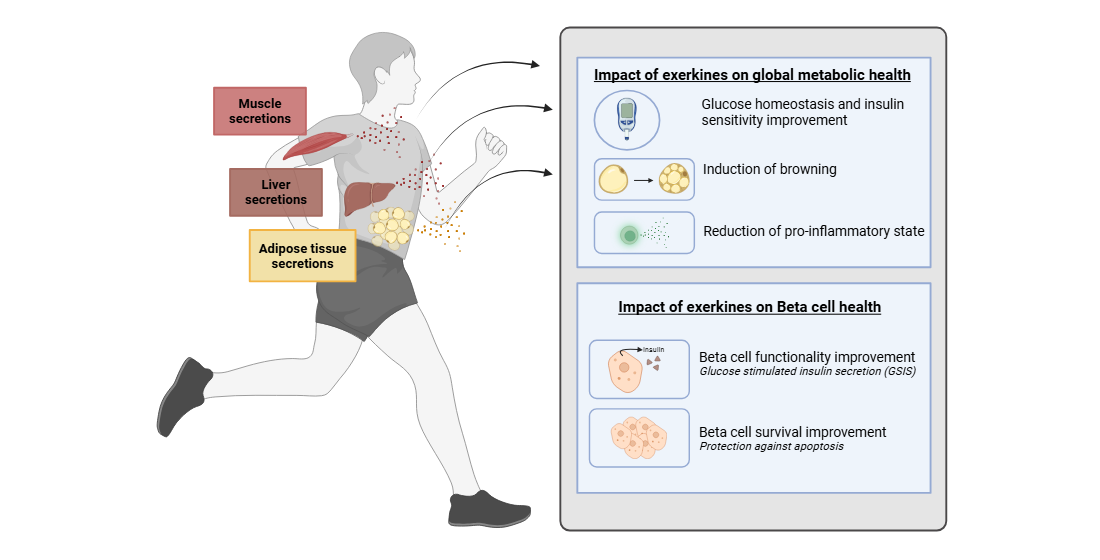Société Francophone du Diabète (SFD) 2023 in Montpellier, FR
March 21-23,
2023
The 2023 edition of the SFD congress, which took place in Montpellier, was an opportunity for Dr Allan LANGLOIS and Pr Michel Pinget to present CeeD's projects.
1 - Pr Michel Pinget with our latest epidemiological study, data was collected thanks to more than 12,000 anonymous screenings carried out between 2015 and 2021.
Written by Pr Pinget, it enlights health of subjects living in the Grand Est Region (France). Screenings involves a large population of unselected subjects, study focuses on non-diabetic adults, i.e. 8,354 people, to conclude that:
- nearly 50% of the population studied is overweight or obese;
- nearly 12% of subjects have unrecognized disturbed (suspicious or abnormal) blood sugar levels;
- this prevalence significantly increases starting the age of 40 and/or for a Body Mass Index (BMI) greater than or equal to 25 kg/m².

2 - Dr Allan LANGLOIS with the projet "Peptide X, a promising inhibitor of MP001 protein which improves human pancreatic islet survival and function”.
The objective of this study conducted in collaboration with Pr Makoto KANZAKI, from Tohoku University in Japan, was to identify a new therapeutic target to treat patients with diabetes and to develop a pharmacological approach.
Thus, our laboratory has identified for the first time that the MP001 protein represents a target of major interest for improving insulin secretion and the survival of human pancreatic islets. Finally, we have implemented a promising pharmacological strategy targeting MP001 to treat subjects with diabetes because this new molecule improves the functionality and survival of human pancreatic islets.
Thanks again to the SFD for making it possible to present these results and for the rich exchanges with experts in the field that resulted from this intervention. These will make it possible to deepen the investigations of the project.Nouveau paragraphe

Peptide X, un inhibiteur de la protéine MP001 prometteur pour améliorer la survie et la fonction des îlots pancréatiques humains
A. Langlois1, M. Kanzaki2, G. Bechtluft1, M. Pinget1 and K. Bouzakri1.
1. DIATECH, UMR 7294, Centre Européen d’Etude du Diabète, Université de Strasbourg, Boulevard René Leriche, 67200 Strasbourg, France.
2. Department of Biomedical Engineering, Graduate School of Biomedical Engineering, Tohoku University, 6-6-04-110 Aoba, Aramaki, Aoba-ku, Sendai, Miyagi, JAPAN. 980-8579.
Introduction
Nous avons montré par protéomique que plusieurs protéines étaient régulées positivement dans les îlots pancréatiques humains lors d'une exposition à un milieu conditionné dérivé d'une culture de cellules musculaires squelettiques résistantes à l'insuline induite par incubation avec du TNF-α. Parmi celles-ci, nous avons identifié MP001. Nous avons démontré que MP001 est une protéine impliquée dans l'exocytose des granules d'insuline et que son inhibition par silencing améliore la survie et la fonction des îlots. L’objectif du projet était de développer une stratégie pharmacologique d'inhibition de MP001 et d'évaluer son effet sur la survie et la fonction d’îlots humains. Pour cela nous avons testé le Peptide X.
Matériels et méthodes
Des îlots pancréatiques humains furent incubés pendant 24h avec ou sans 0,1µM de Peptide X. Leur fonctionnalité a été évaluée avec un test de sécrétion d'insuline (GSIS). De plus, l'effet du peptide X sur la survie et la fonction des îlots a été étudié par Western blotting en ciblant les protéines AKT, PGC1α, Tbc1d1 et AS160.
Résultats
Le Peptide X potentialise la sécrétion d'insuline par rapport au contrôle (Peptide X: 16,7mM glucose = 4,35±0,52% versus 2,8mM glucose = 1,24±0,33% du contenu d’insuline total, p< 0,001; Contrôle: 16,7mM glucose = 3,30±0,39% versus 2,8mM glucose = 1,25±0,28% du contenu d’insuline total, p < 0,01; n=13). De plus, nous avons observé que le Peptide X augmentait significativement l’expression de protéines impliquées dans le trafic des vésicules d’insuline tel que AS160 (185±36% versus contrôle, p<0,05; n=9) et p-Tbc1d1 (180±39% versus contrôle, p<0,05; n=7). Enfin, le peptide X améliore la survie des îlots humains en augmentant l'activation de l'Akt (p-AKT/AKT: 180±47 % versus contrôle, p <0,001; n=7) et l’expression de PGC-1α (146±12% versus Contrôle, p<0,05; n=5).
Conclusion
Nous proposons que le Peptide X, en inhibant MP001, pourrait être une approche thérapeutique prometteuse pour les patients diabétiques.




